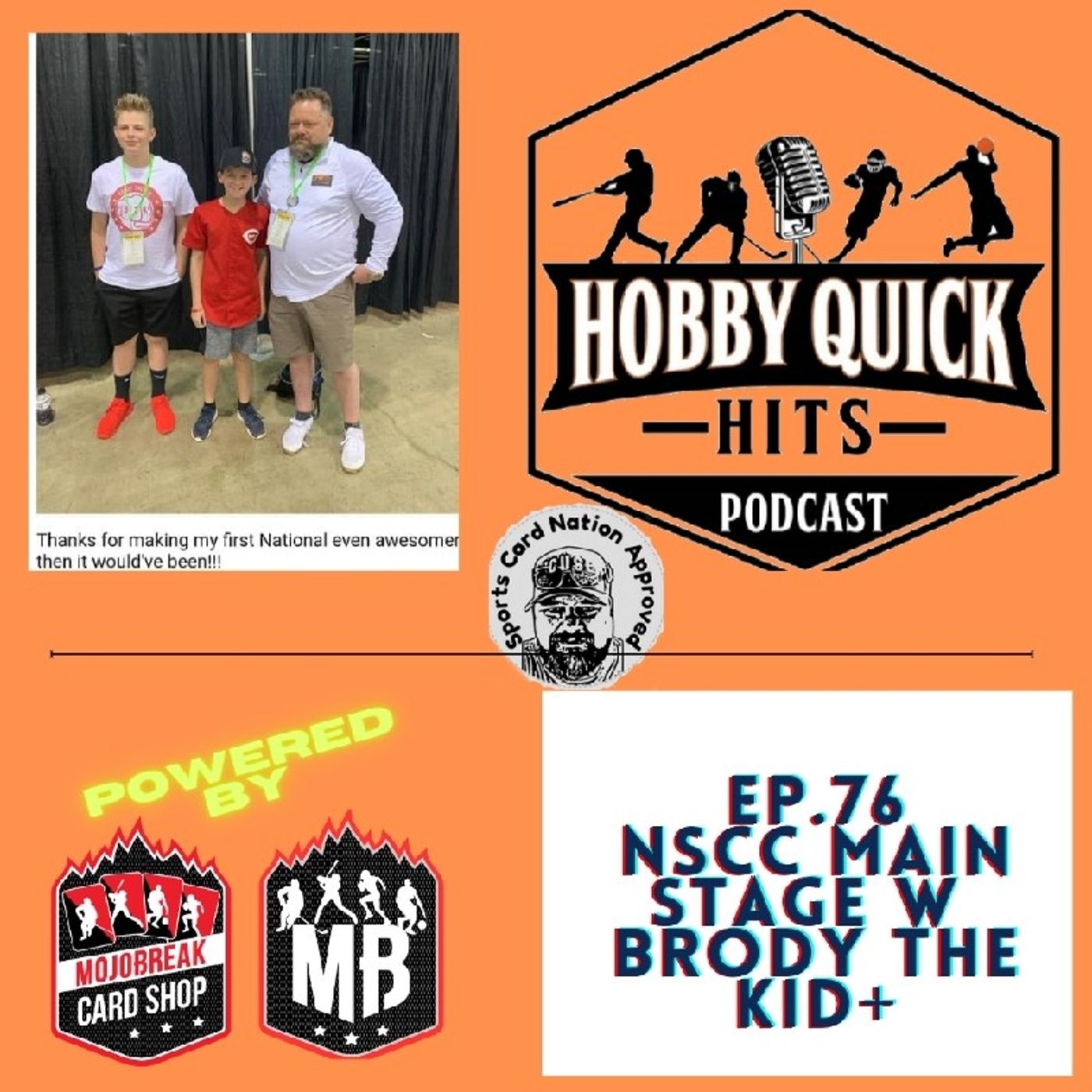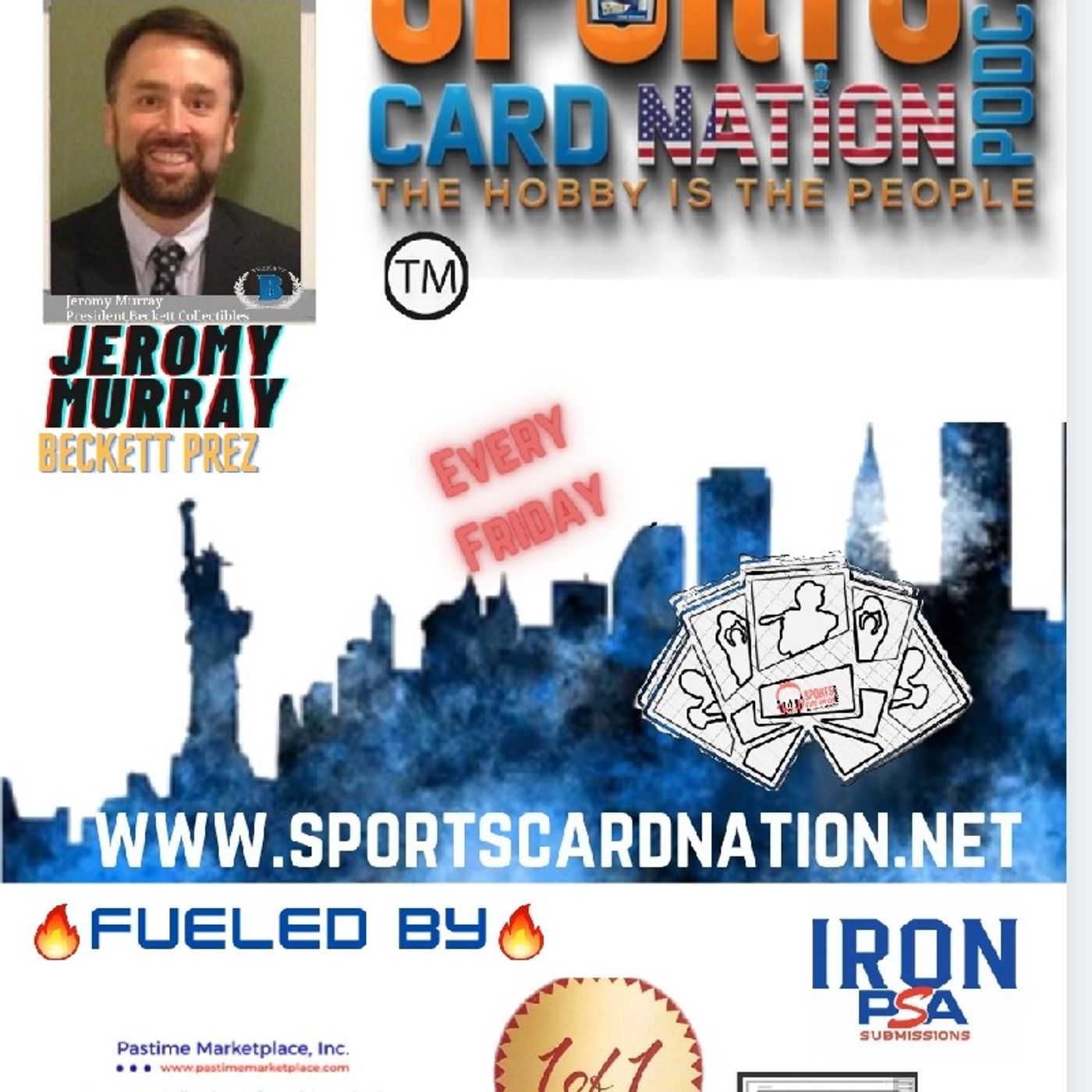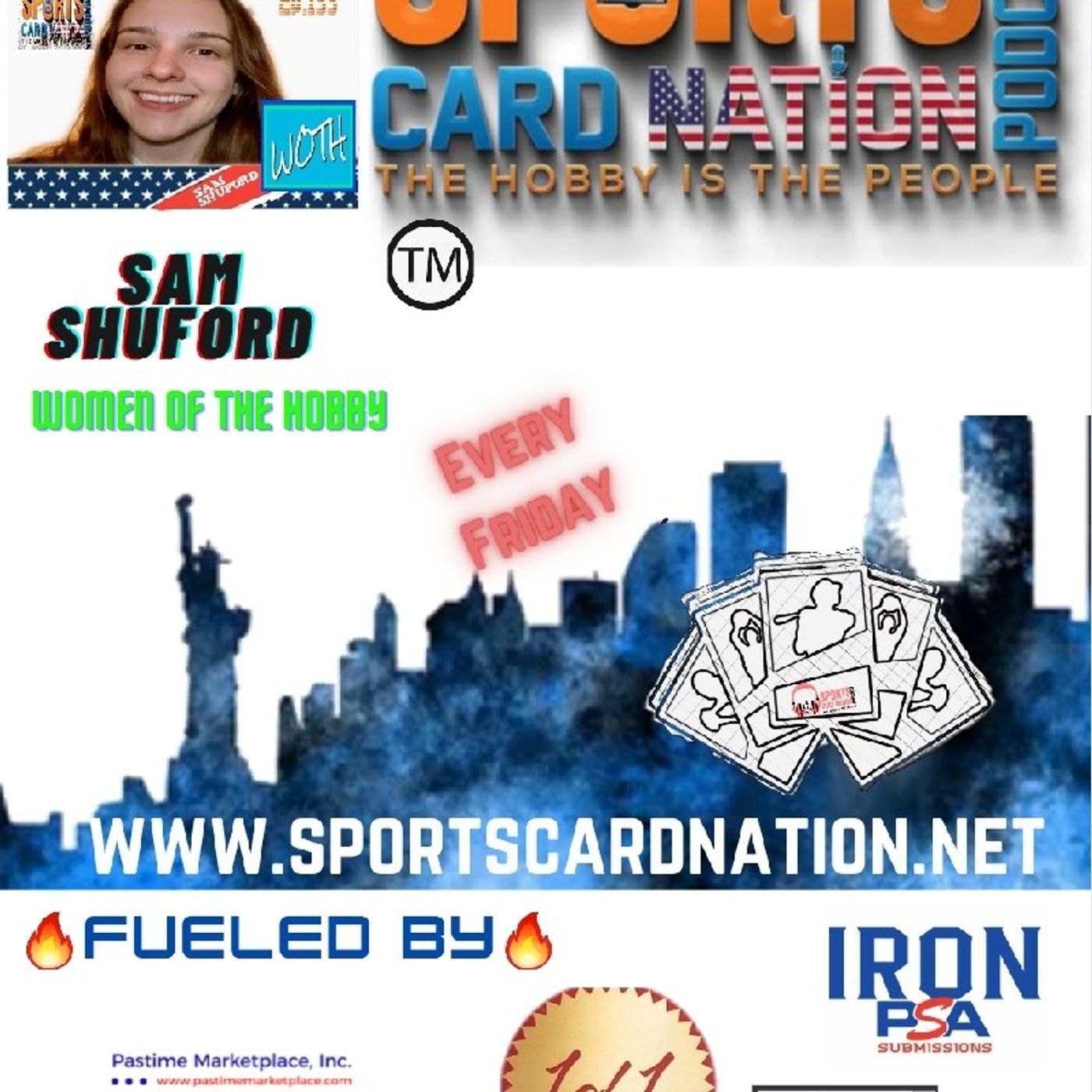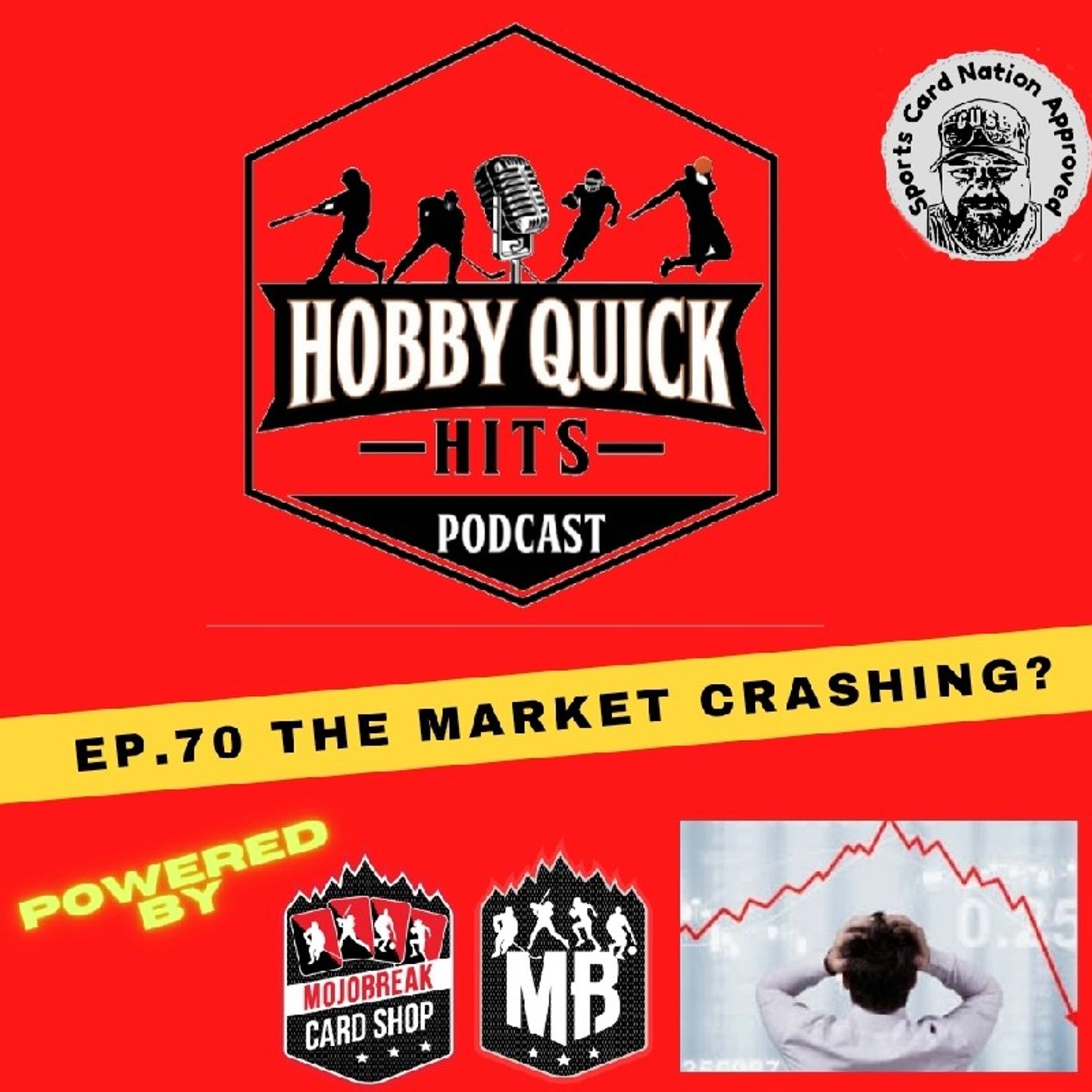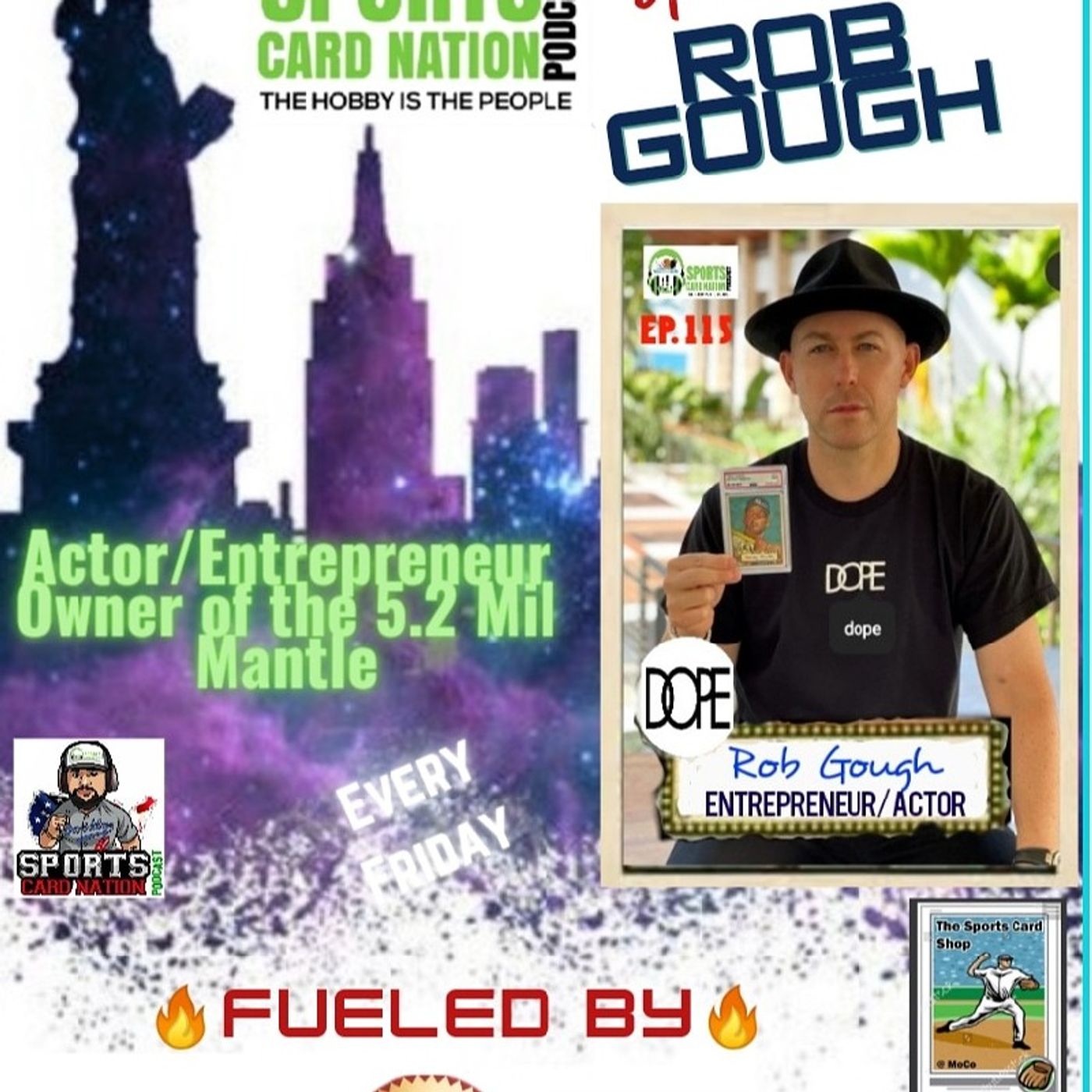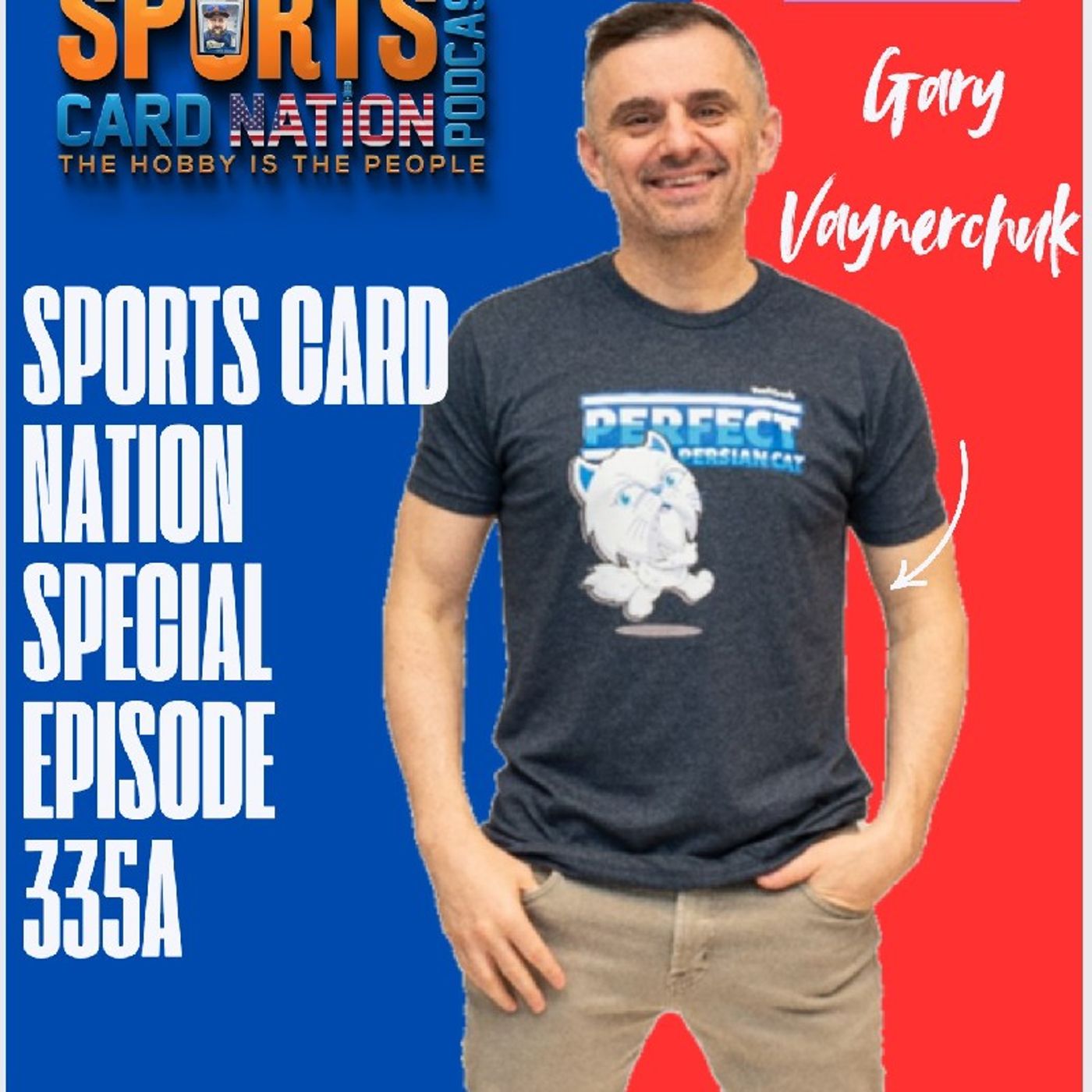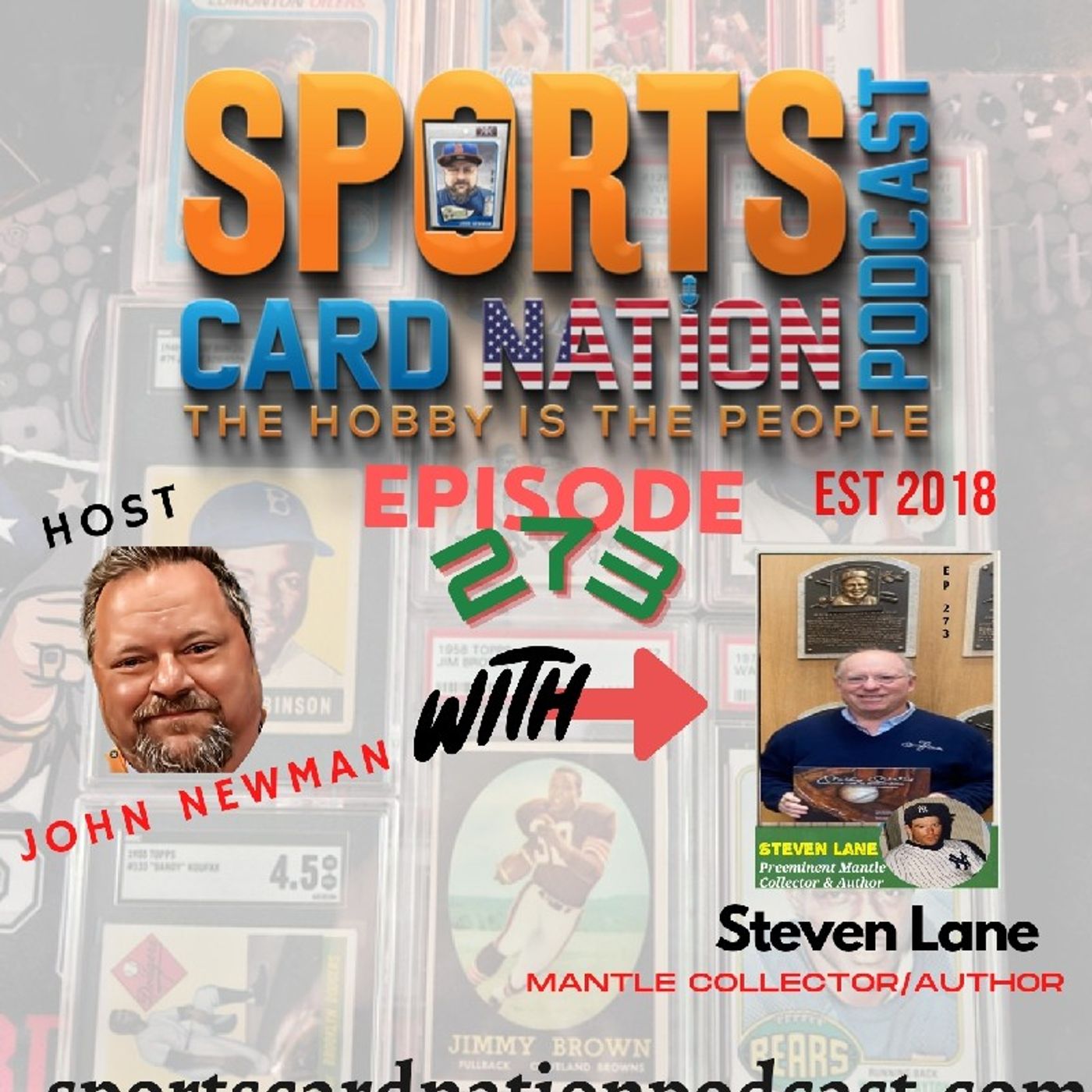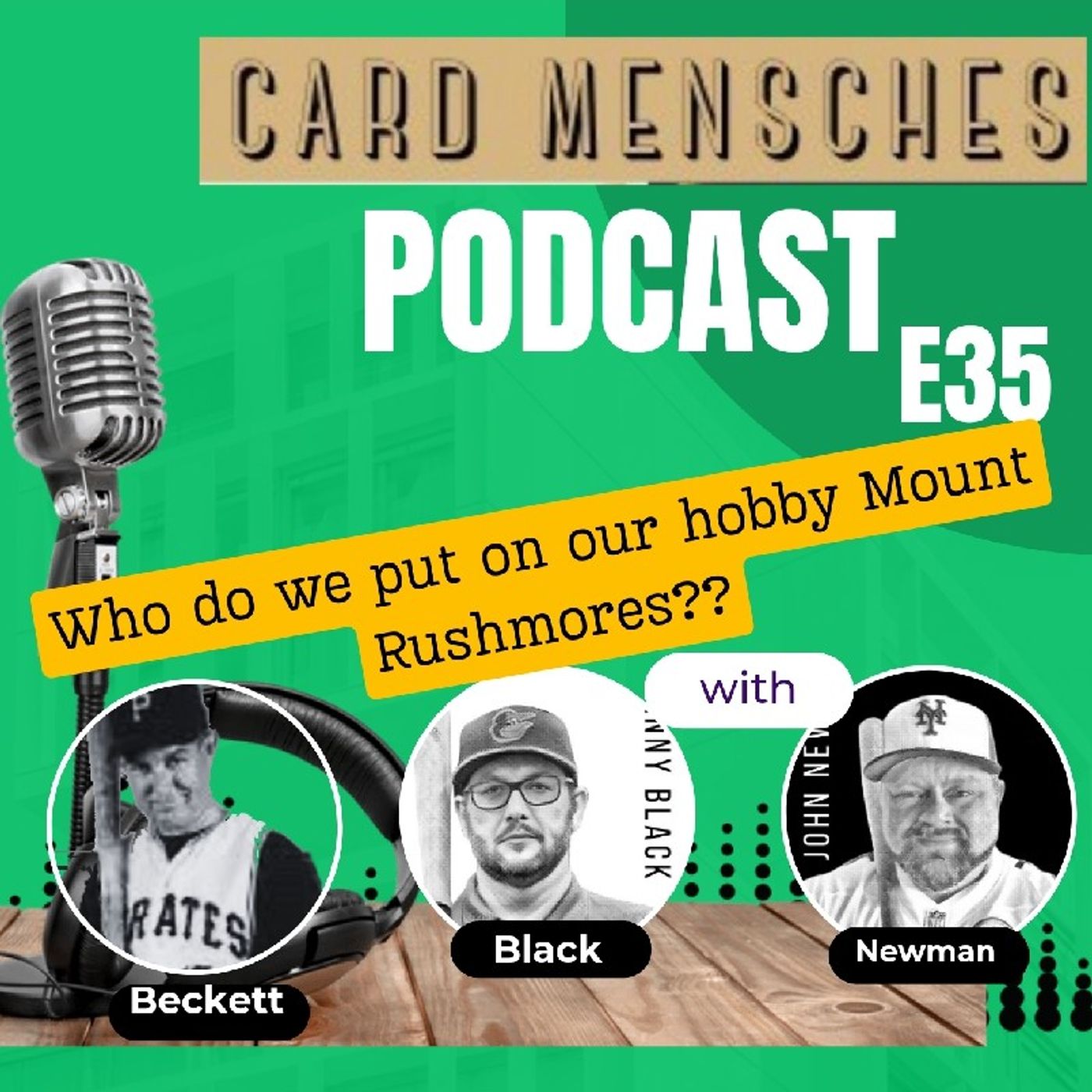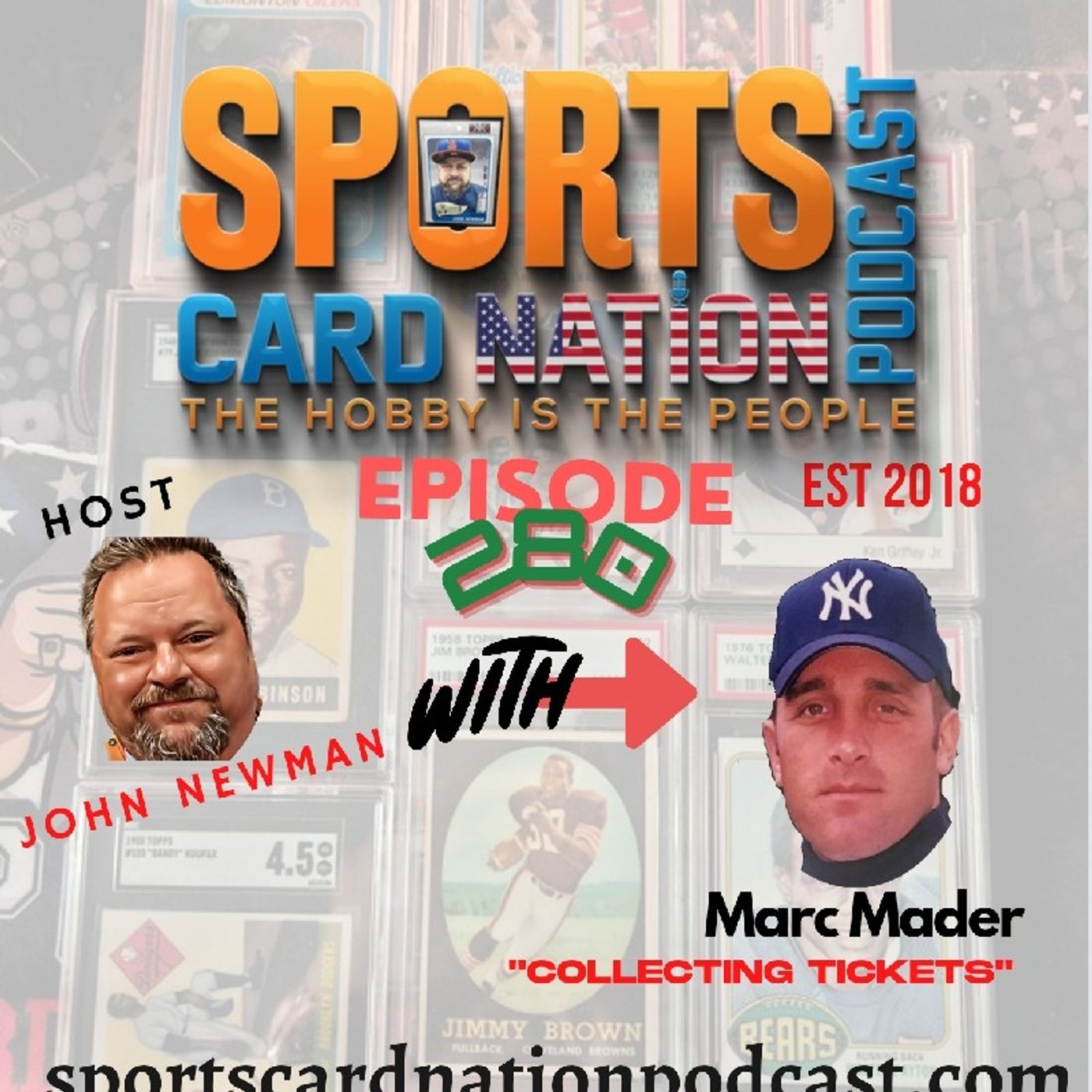Ep.254 w/ Mike Cramer of Pacific Trading Cards "Changing the Game"
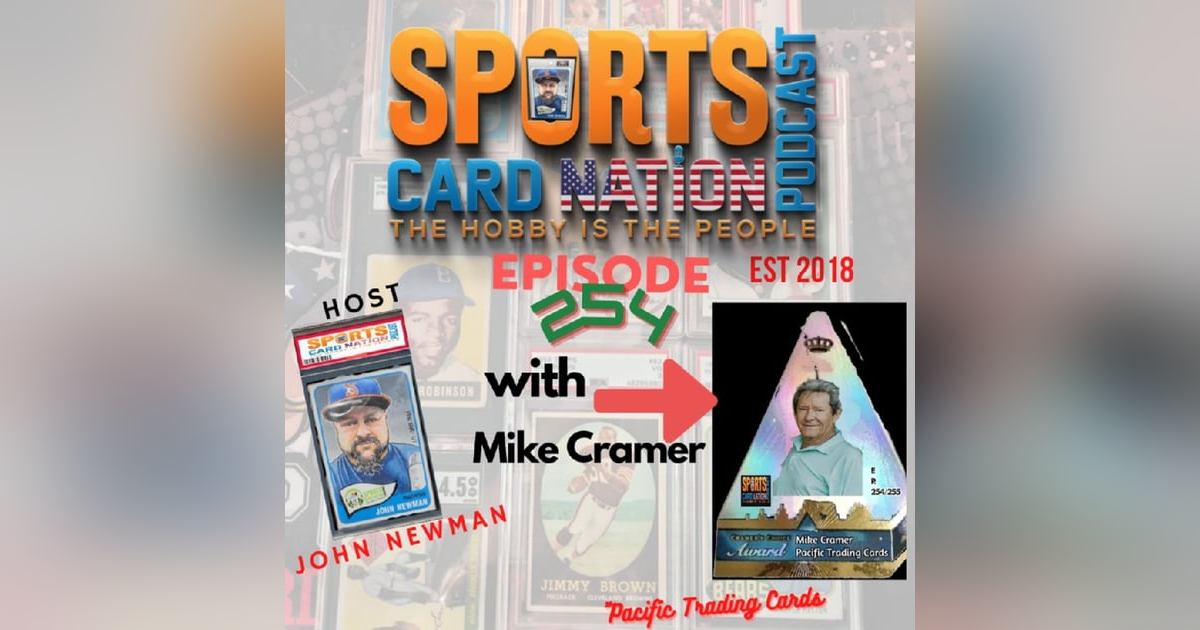
One of the Hobby's greatest innovators join us today. Mike Cramer of Pacific Trading Cards.
Talking Points:
*The Beginning and end
*Innovation and competing with the big boys.
*Taking Risks & Making cards yourself
*Guessing right on Brady & Griffey Jr.
Follow us on Social Media:
Website:
https://www.sportscardnationpo...
.com
https://linktr.ee/Sportscardna...
Become a supporter of this podcast:
https://www.spreaker.com/podcast/sports-card-nation-podcast--4761791/support
.
SPEAKER 1: What is up everybody? Episode 2 54. Happy to be back again. Got a great guest today.
SPEAKER 1: Someone that, you know, in my heyday of, of being in the Hobby in the eighties and late eighties and then into the nineties, the gentleman behind this company, was important to what was going on and those effects are still being felt today and those ripples are still being felt today even though the company is no longer a around makes no difference.
SPEAKER 1: He is innovative, creative hands on and, he's our guest today, Mr Mike Kramer of Pacific Trading Cards. This will be part one, we will part two next week. We cover a lot of ground II. I know it was a, a privilege and an honor for me to speak with, with Mike and I didn't wanna like not ask any questions.
SPEAKER 1: So, it's a long interview, but rather than do one super long episode, we'll break them up into two reasonable length ones. So, this week, part one, next Friday, part two and very candid and, and just had a great time.
SPEAKER 1: You know, learning about the history of the Hobby, the history Pacific and the history of Mike Kramer.
SPEAKER 2: Hi, this is Pat Hughes Cubs announcer. Coming to you from the sports card shop in beautiful New Buffalo. Michigan. The Goer family has built an incredible place here for collectors to buy, sell and trade cards and, and memorabilia.
SPEAKER 2: Be sure to stop by and let them show you around the sports card shop dot com. Connecting sports athletes, the Hobby and collectors around the world. Hi, this is Allen Pinkett and I'm here to tell you, the Goer family has done it again.
SPEAKER 2: They've just opened up the sport card shop in downtown Valparaiso, Indiana and it is awesome.
SPEAKER 2: If you're a collector, you need to check this place out.
SPEAKER 2: Tell them Alan sent you and get a free gift on your first visit.
SPEAKER 3: Are you a new sports cars collector or someone returning to the Hobby? Maybe you're just looking for a friendly trustworthy Hobby community to hang out with and enjoy collecting Midwest Box bras has been bringing collectors together for many years with affordable brakes, helpful grades and a discord group packed with generous people who genuinely care about the Hobby and other collectors.
SPEAKER 3: Check out the breaks at Midwest Box brakes dot com. Our goal is to bring you as much value as possible. Also find us on Twitter at Midwest Box.
SPEAKER 1: Brings also remember to check out Midwest Box breaks, marketplace for brakes packs and single cards from over 300 trusted sellers apply to sell today at ISO dot GG forward slash Midwest Box break.
SPEAKER 1: One thing I love about this podcast, it allows me the opportunity to talk to people who were very inspirational to me as a collector and even a dealer growing up with, with my 40 years in, in the Hobby. And this next gentleman on the sports car shop, guest line checks all those boxes and really excited to talk to him.
SPEAKER 1: He's one of the original innovators when we, when we talk about cards and manufacturing and, and design and I don't wanna make them wait too long to, to finally get him to say some, but Mr Mike Kramer of Pacific Trading Cards. Welcome.
SPEAKER 4: Oh, thanks for having me, John.
SPEAKER 4: Can't wait to get into a little discussion and talk about that.
SPEAKER 1: Yeah. And, and you know, you, you got a new book, Kramer's Choice appropriately titled much like the, the insert set there it is for those watching on video. I was in, I was you know, privileged enough to, to get to read a digital version of it which I read very quickly. That's how good of a book. I'm not a huge reader. The truth be, I mean, I can read.
SPEAKER 1: But when I find a good book, I, I usually consume it pretty quickly. That's a sign to to me that I'm, I'm generally interested and I, I don't want to put it down, so to speak. And so your book, definitely checked all those boxes and, well, Mike, I knew quite a bit about your history.
SPEAKER 1: This really let you know, you pull the curtain up and let people kind of see stuff that at the time, obviously, we on the other side of the curtain, we didn't know all the, the intricate details where you kind of let us behind there with that. And i it was, it was like I said, a great read, I'm sure others who haven't read it yet, but who will will, will attest to that.
SPEAKER 1: And as well, I guess my first question here lighthearted. What do you miss more king crab fishing or, or running, running a card company?
SPEAKER 4: Definitely the running the card company, king crab fishing was for me a long time ago. I, although I did it for 10 years, but it kind of wore me out over the years. So running the card company was the greatest job on earth in my opinion.
SPEAKER 4: And and I did have a good time doing it. I miss it somewhat, but I also know that I spent my time doing it and, and everybody's time ends at some time and, and mine ended, but I had a great time doing it.
SPEAKER 1: Yeah. And, and you did a great job. We're gonna talk about some of that stuff you brought to the Hobby that's still, we're still seeing today. It's that good, that, it can still be utilized in, in, in 2023.
SPEAKER 1: And, and beyond and, and, you know, you, you did king grab fishing before it was, like, cool and, and the deadliest catch made it sort of cool. But, like, you know, people don't realize that it's people unfortunately sometimes lose their life. It's a, it's a dangerous job while it has its probably fun moments.
SPEAKER 1: It's, it's a physical, it's a physical you know, profession and one that sometimes, hopefully not, but sometimes can cause someone their life and, but it was that it was that job have that really fueled, you know, Pacific and sort of, and especially in the early days, funded and kept, was the foundation sort of for what became pa Pacific Trading Cards. I wanna start out. We kind of talked before, we hit record.
SPEAKER 1: You know, this is a 1975 Phoenix Giants, Minor League set, featuring its 26 cars set. There's, I got you right on the, the top of the set you holding some cards up and, and some of your collection, this was really a as you, you talked about it in the book, like this was really your first foray into producing cards.
SPEAKER 1: Obviously, you were a dealer from a fairly young age, but this was your first, you know, production attempt, very successful, led to other teams contacting you and saying, hey, do our sets as well at that time, 1975 did you, did you have some, you know, glorious thoughts of, of long term what you wanted to do or was it? That's what you were doing at in the moment, It.
SPEAKER 4: Was actually just, that's what I was doing in the moment. But in the back of my mind, I always had the thought of what if I could, what if I could make major league baseball player cards or, or NFL card, hockey cards.
SPEAKER 4: But at the moment, that's the, the for a I got into card manufacturing was at 1975 set and I had such a good time doing it and it was so rewarding.
SPEAKER 4: I, I just kept pushing that envelope a little bit and, and the next year I made some more cards in color and I put myself in that set because the Phoenix Giants gave away 2506. And, and I thought what a what better way to reach possibly other collectors and, and try to start a trading trading card.
SPEAKER 4: Club or something down in Phoenix when I lived there and it worked and the fact that I it ended up like 30 40 years later that card. Now people collect it. But it was actually just to try to get me to introduce to people and it worked. So I was happy about that.
SPEAKER 1: So for, for clarification purposes, that's the Mike Kramer rookie card.
SPEAKER 4: Yes, it is. And I think it's the only one I have. I, we never made another one. We made a Bobby Net doll of me but, but that's the only card I have and my grandkids love it. And a and a few collectors say, yeah, they like that card too. Do you ever.
SPEAKER 1: Get, do you get them in the mail? Like the, the sign that people tt M you, the the card too?
SPEAKER 4: I've I, every once in a while one shows up and I'll sign it and send it back and, you know, I guess that's what, you know, collectors do. They, they want cards signed and I'm, I'm happy to sign. That's cool.
SPEAKER 1: So, and did I hear you? Right though. I didn't realize this. If this is the case, I'll, I'll, I'll have you, you never appeared on a Pacific trading card? I know the bobblehead.
SPEAKER 4: No, never did.
SPEAKER 4: Just wasn't, you know, I just wasn't gonna make a car to me for the heck of it.
SPEAKER 4: That 75 1 had a purpose and, and, and so, no, that we never made another one of the, in a Pacific product, probably should have, but just never, the opportunity never came up.
SPEAKER 1: Well, I, I think it's cool. Like I'm not saying you, you legitimately could have, you had your, you had your, your sets where you pick kind of the, the players that made it like your, your Kramer's choice. You could have even put like a picture yourself on those with kind of a quote or whatever why you, you know, but, I think the fact you did it, it, it really speaks volumes of, of you, right.
SPEAKER 1: It, it's, it was about the players and, and the sports, and you, you know what I mean, at the time and, you know, and, and that's what it was about, although I wouldn't have blamed you and I'm sure many others wouldn't have either. Had you had you made a, specific trading card, Mike Kramer, you talk, well, we'll talk a little bit about the bobblehead here.
SPEAKER 1: And in a little bit, you know, one of the things is the innovation and, and, and I don't have all the stuff that, you, you did at Pacific, it's a long list of book, goes over a, a good portion of that which, which, learning how you sort of came up with the idea of where it sort of came from.
SPEAKER 1: I, I found very interesting but one of my favorite designs is, and I'm holding this card up, which is the, the crown collection, which the card is die cut. Nowadays, we see these and it's an insert set and they, and they can still be, but you made, you know, this is a, a base card if you will.
SPEAKER 1: And you made a set that looked like every card should be like an insert set.
SPEAKER 1: You got the sort of the holographic foil, that crown, just a very cool card and, and at the time, you know, we can make an argument that some of the other companies were sort of lacking in innovation, Mike and it was you that really took the baton and, and started running with it, I think it's, it's your design that really sort of fueled other companies took notice, let's say and said, hey, you know, look at this, you know, at the time, smaller company that's getting bigger.
SPEAKER 1: And they're sort of setting the, they're, they're the trend set here yet. We're sort of supposed to be the big, the big man on campus. And it really, I think I kicked in some of those competitive things.
SPEAKER 1: I mean, was that sort of the, the thought process? Ii I know like in the book, you say, listen, you were just trying to make cards that you, if you like, you figured more other people would like it, too. But, how much of it was?
SPEAKER 1: Hey, we, you know, we need to make some sort of a name for ourselves and, hey, these other companies are sort of sitting on their hands, instead of thinking outside the box here and we're, we're not gonna do that here at Pacific.
SPEAKER 4: That, that was a lot of it. We we wanted to make something different and, and new and not the same old thing and that it's a testament to, to what we did back then that almost everything being made nowadays looks like something that Pacific did back then.
SPEAKER 4: I'm told that almost every day by collectors that the cards they collect nowadays look just like what Pacific did. They might have different foils and different motifs to them. And, but, but what are, what we made back then looks just like what they're doing.
SPEAKER 4: The, the most interesting thing to me is the gold Kron DACA that you showed is still being made by Panini. That same exact shape is still being used. And that was an insert card.
SPEAKER 4: The one you're thinking of was a crown royal, which was a different shaped crown, but they're still making that also. And I can't think of other cards designs that are that unique that are still being made nowadays. That, that exact same design lived on and, and I'm pretty proud of that.
SPEAKER 1: And he, and he should be, I think it's, I think it's a poor and I always say, like, when some, you know, we have a lot of new Hobby, the Hobby is growing, obviously Mike. And I think sometimes and, and I, and it's not necessarily their fault.
SPEAKER 1: I'm just saying if someone new comes in the Hobby, they may not know the history of the Hobby now, whether they go back and, and research that or dive into it, that's up to each individual. I've just been involved in, in the Hobby for 40 years. Like you wearing, a lot of different hats, not as many, as you.
SPEAKER 1: But, you know, I always say we're here now where we are in the Hobby because of what happened before, whether, you know, that or not doesn't change the fact that we wouldn't be what we see in 2023 if, you know, 1975 Phoenix Giant, that doesn't happen and lead to, Pacific and then innovation and, and other companies too.
SPEAKER 1: But, you know, what's, what happened in the past has gotten to us, you know, gotten a Hobby where it is now, you can't have one mutually exclusive, of the other.
SPEAKER 1: They're all connected now, whether someone knows that or acknowledges it, that's a whole different show. But the fact to me is that, it is the, I mean, not that you need to toot your own horn. But do you, do you feel like you get enough credit for some of that innovation that you brought to the Hobby.
SPEAKER 4: Starting to get it, in the last couple of years I've heard that, from collectors so many times that, that we started it all. Pacific started it all and Pac and Pacific, led to what the Hobby collecting now. And I have to tell you during the time that we were making those, outrageous cards is what they called them back then.
SPEAKER 4: We weren't getting a lot of credit. In fact, we were getting, sometimes articles in some of the Hobby papers that said, you know, we were getting way out too far out and, and we just were way too far ahead of our time in some case.
SPEAKER 4: But, I think now it's being, known more and more and one of the reasons I wrote my book is I heard that so much, from, from, collectors and dealers and, and, I started to visit some Hobby shops and they, they were all saying, great things about what we did back then and the collectors are in their stores buying the same looking cards that we made.
SPEAKER 4: I, I like the cards that are being made now because they look like what we, and it's kind of the same theory that what we're using. And so I'm happy about where, where it went.
SPEAKER 4: And I think, I think collectors are intrigued by the cards being made nowadays because they, they're exciting looking and, and, and some, in some cases wild looking and, you can only put so much down on a 2.5 by 3.5 size card. And, and it's been pushed quite a bit nowadays.
SPEAKER 1: When, when you see AAA Card or a company that makes a card that is obviously based on a Pacific design. And I'm not talking about where the, it's where the, the, the intellectual property has been necessarily purchased but where it's just sort of a, a copycat or a, a, a rendition that, you know, you sort of did first.
SPEAKER 1: Does it, do you find it flattering or is there a part of you? That's kind of mad that, hey, like in the way that it's kind of, they stole sort of my idea or a little bit. Maybe even of both.
SPEAKER 4: I never think about that. They stole my idea. I'm, I'm totally flattered. For example, Tops did, recently, Tops, 206, the little small ones I looked at that and said the Pacific, private stock 206 cards look exactly the same. They just kind of use what we did.
SPEAKER 4: That's so flattering. To me because I'm not in the business anymore but the fact that, that what I did, they're using my ideas. I mean, it's, it's nothing but flattering and I'm not, I'm not ever mad about it or anything because I'm, I'm beyond that.
SPEAKER 4: And, you know, I only look back and go what we created and what we did, they can't come up with something different so they use what I did that, you know, it's gotta be flat.
SPEAKER 1: Yeah, that's a great attitude and, and an approach to have Mike and, and reading the book, you know, this is obviously something I didn't know at the time and didn't know until I read the book is you are very hands on.
SPEAKER 1: In other words, when it came, even to the machines that that had to put, you know, wrap the, the cards, you, you learn how to fix them, modify them to products you were developing and that sort of thing and you know what a lot of other people would have ran into like dead ends and maybe threw their hands up and said, hey, I can't do this. We try good, try everybody.
SPEAKER 1: That's it. That's a wrap.
SPEAKER 1: You, you were persistent. You found ways to make it work whether it be modifying AAA machine to, to fit the needs of a product that you were going to make or even just finding machines or, you know, just, hey, we need, you know, we're ramping up production. We, we, we need to purchase more machines and, and like finding where some were available and adding them to the arsenal.
SPEAKER 1: So the production didn't really s cease or stop or, and then if anything increase and make it easier what you're doing for, not only you but your staff that was growing at the time, we all always sort of had that initiative. Even as a, as a young man or did you always, is it an acquired trait?
SPEAKER 4: No, I've always been like that. If I wanted to get it done, I figured out a way to do it. And even back when I was when I was, and you read my book obviously, and I'm very happy you did that, those machines like the, the DF wrapper, that wrap made wax backs and there's a picture of that machine or I book.
SPEAKER 4: And I, I wonder how many actual collectors of wax backs have ever seen the machine that actually makes that made those wax back and we all used them, all the companies that made, wax specs back then, use that same machine. But, but that was what I had to do and, and I've always been resourceful and being been able to figure out anything I needed to figure out.
SPEAKER 4: And I it, it was nothing more than it had to, it had to be done. I had to do it and I read the manual how to, change that machine over from wrapping candy to, wrapping, baseball cards. And, then, it all took off after that as far as Pacific it, it just made leaps and bounds.
SPEAKER 4: And so, oh, it's, it's just in my blood that I, if I need to do something like writing that book, I, I'm not an author but, I decided I would be, I don't even know if I could spell author when I started it. And, I ended up writing that book because I wanted to and, and, that's just the way I am. I, I'm just one of those guys that can do it if I need to.
SPEAKER 1: Yeah, that's, well, that's a great, that's a great trait, to, to have and, and perseverance.
SPEAKER 1: It, it's worth more than, its value, in, in, in, in money where I think, you know, reading those, those chapters too. My, I, I said to myself, there's other guys that would be in the same predicament that would just give up or say, hey, man, it just not meant to be that sort of thing and you didn't do that. You know, you, you persevered, you figured out, there's more than one way to do things.
SPEAKER 1: You can in, you can innovate, you can improvise and keep going and you know, and, and I Pacific was all the more better cause you made those calls and I did, did you ever have moments where you really, you know, at least internally, like I don't know if I'm that we're gonna make it or how long I can do this for it. It's difficult. Do you ever have those? I internal maybe quiet moments.
SPEAKER 4: Never. It was, it was so busy back then. We were so busy you know, finishing the product, starting a new product.
SPEAKER 4: Coming up with new ideas that, that it was a constant rumble, so to speak.
SPEAKER 4: And never had a stop moment where I went. Oh no, what am I doing? It? It was just not like that. It it was like same thing with fishing, you know, it was nonstop work all the time. Never quit hauling gear and, and the card business was the same way.
SPEAKER 4: I, I even say in my book that when I got all done and sold the company and walked away.
SPEAKER 4: I couldn't believe how different the whole world was, but yeah, I was a, I was a nonstop go getter.
SPEAKER 1: Yeah. And I, I remember reading that like you, you, you, you kinda could breathe, you, you, you know, like you, you, I, I know you mentioned you woke up like the next day like I don't gotta go to work today.
SPEAKER 1: It was kind of a, a weird feeling, I'm sure for you, but in a way, sort of a relief too, like the pressure, like you, I think the term you use, like, the gorilla was off your back. You didn't even really realize you had one on there until you didn't, anymore. Sort of that weight and pressure was, was, was gone.
SPEAKER 1: And you got to do some stuff probably, you, you know, that you didn't get to do because, you know, duty always sort of called. You even mentioned even when you took vacations with, with your spouse.
SPEAKER 1: You were still sort of on call or on duty.
SPEAKER 1: And, and so while you may not have been, in the state or what have you, you were still, your mind was still on your company and how things were going and, and what was going on even when you weren't there and, and cause it's your baby, right? You, you want everything to, to be great and now you, with that retirement, if you will, you sort of can let your hair down, so to speak.
SPEAKER 1: And like, hey, I don't have to worry about, what's going on and, you know, today I, I can worry about me and hey, what do I wanna do? I got the whole day, to fill with stuff I really wanna do and not sort of my mind be in two places. Can be in one place. And, you know, I thought that was pretty, pretty telling and, and, and interesting.
SPEAKER 5: It's time for a quick break, but we'll be right back.
SPEAKER 6: Iron Sports Cards is your number one source for all your PS A and other grading submissions. Their elite status improves turnaround times. Heck, they even provide the card savers. Their chat rooms provide updates on all your submissions.
SPEAKER 6: They also offer wax options and single cards to cover all the bases. Check them out on Facebook at Iron Sports Cards Group or on the web at Irons sports cards dot com or even give them a call at 1877, Ir Onps. A Rob's got you covered.
SPEAKER 7: For more than 30 years. Robert Edward auctions has been the nation's premier auction house specializing in sports memorabilia and trading cards with significant experience and expertise in all major sport, non sport and Americana collectibles.
SPEAKER 7: Re A has helped clients achieve record breaking prices for their items and has done so with a reputation for integrity and transparency by actively partnering with collectors and enthusiasts throughout the entire process. Re A has created the Hobby, most trusted forum for selling high quality collectibles. Go to Robert Edward auctions dot com for more information on how to buy or sell in their next auction. Let's go.
SPEAKER 5: You are listening to the Sports Card Nation podcast.
SPEAKER 1: You know how much back during those days when you had all the different companies like, you know, yourself with Pacific tops upper deck clear scoring until a lot of those started going by the wayside. I, I know it was competitive.
SPEAKER 1: How much like internally would like, like if you came up with a new design, let's say, were you worried about somebody like letting the cat out of the bag or taking a picture and sending it somewhere else? Obviously, we didn't have Social Media like we do now or even technology when it comes to photo sharing and stuff.
SPEAKER 1: Was that a concern or, or not really a a at that time when it came to like, were other companies worried about what you were doing and vice versa? Were you concerned that something you did all the leg work on, you know, someone was gonna get those sort of plans if you will and, and try to do it at the same time or, or beat you to the punch.
SPEAKER 4: We didn't, we didn't really have any worry about somebody taking our design and or, or finding out about it because we had a, everything was done in, we didn't have any outside graphic or design work. It was all done in house.
SPEAKER 4: And so we had control over that and, but we were always wanting to get that design card design, the new out in our product first. Because as we saw how other companies would we come out out with the design person, then other companies would begin to do something similar.
SPEAKER 4: And so we were, we were scrambling if we came up with a new idea to get it out and not really rush it to the market, but, but get it our product first because the, once it was out there, you know, obviously other, the other company saw what we were doing and that's how it evolved to how, how the cards are being made nowadays is it, they can all look like what we're doing back.
SPEAKER 4: And so, no real concern about somebody stealing at first, but the fact that we wanted to get it out there does So collectors would see what we were doing.
SPEAKER 4: That was a, a big drive for, yeah.
SPEAKER 1: One of the great advantage you have and it just, you know, and just, I did know even before reading the book. But obviously you went into more details that I didn't know is you printed, you know, you printed your own, your own products. You, you know, you were hands-on where a lot of these other companies were outsourcing.
SPEAKER 1: That and I think that's where maybe designs or information leaks out cause it's not protected under your four walls. The how much of an advantage even besides cost, even how much of an advantage was having those processes in house where others didn't.
SPEAKER 4: Well, we, we did all of our pre press work designs and, and actually made the film to print and we did all of our own packaging. We outsourced most of the printing was done outside but under, under great security. But the fact that we did all of our own designs and pre press work and packaging.
SPEAKER 4: Number one got us a a lot of contract work and and allowed us to have the control over the, the designs and, and I would go down to the graphic department, at least once a day and look at the designs and, and having that great control on, in your hands, led to even better looking cards and, and then the fact that we could package the cards in house, was really in a huge advantage to us also. Yeah.
SPEAKER 1: No, out that way you, you hit those deadlines. You, you, you knew like, hey, I need sort of all hands on deck so we can get this out on time where rather than rely on another company to have that same initiative or, or motivation.
SPEAKER 1: How much of that? Was it an issue in the Hobby then Mike was, were, were companies trying to find out what Pacific was doing and, and vice versa or was everyone sort of head down kind of worrying about their own, what they were doing internally?
SPEAKER 4: I'm sure they were paying attention.
SPEAKER 4: I, I actually witnessed a couple of times where another company, when we were at a trade conference, scrambled to get some of our sample cards that we were handed out. And I laughed about it because it was almost comical that, what was going on.
SPEAKER 4: But I, but I, I never was concerned about it because number one, we were out there first with, with almost every thing that we, created and, and I, I never looked at what they were doing the other company, but I'm sure they were paying attention because we were, from about 1998 to 2000, a couple of years in there.
SPEAKER 4: We had three major, licenses, baseball, football and hockey and we were a factor.
SPEAKER 4: And people were paying attention, the other companies were paying, pay attention, no doubt.
SPEAKER 1: And as they should and like you said, you, you know, you are a risk taker, I think, I think you'll agree with me. You can, you can tell me if you do or you don't, I think that the fact that you're a risk taker really led was one of the reasons Pacific was, was a success is because you did stuff that maybe someone else would have been too scared to do.
SPEAKER 1: You know, a couple of instances, and you, and you talk about in the book, but even, even if you didn't read the book and you're kind of a Hobby, sort of historian, or, you know, you know, you, you made, you produced the most Tom Brady releases in the year 2000 before. He was a household name and AM VP and Multi Ring, owner.
SPEAKER 1: He was, a mid round, a late round pick that it was supposed to be, Drew's back. Drew Bledsoe's backup for longer than it turned out to be. But you, you saw something as you wrote, you saw that it, you know, the it that we, we talk about it, but no, we really can't quantify it in words, it's just the it factor.
SPEAKER 1: You saw that early on and said, hey, I'm gonna, I'm gonna make cards of, of this young athlete where others are probably writing them off already. That's just the guy that will probably be out of the league in three or four years and just a footnote in, in draft history and you saw past that you saw, you saw something there. And like you said in the book, he has the most rookies are Pacific produced cards.
SPEAKER 1: You took another risk, put up with an item that I still love to this day. I won't eat it anymore. But, but you know, 1989 you, you, you know, I know he was you know, being the son of Ken Griffey. Ken Griffey Junior, but he hadn't proven anything at the time.
SPEAKER 1: And you, you produced quite a bit of candy bars that you made the candy bars themselves. And I did an article, I know you, you saw that the candy bars themselves became a collectible. How often can you, can you say that?
SPEAKER 1: I mean, there's been athlete candy bars before the Reggie Bar was one I grew up on as a, as a younger kid. But they were just a candy bar with a, a photo on the outside. Your, your Ken Griffey Junior bar was in a way a collectible besides the chocolate that was, you know, and, and even the chocolate itself had designs and, and stuff on it as well.
SPEAKER 1: You could easily just made the wrappers as you did and just have the chocolate inside. But you, that was your attention to detail. You wanted the chocolate Mike to, to be representative of, of the athlete and you took a risk there because Ken Griffey Junior wasn't Ken Griffey Junior as we know him today yet.
SPEAKER 1: And you know, where did that wrist take? I may be working on, on those, you know, fishing boats and charters, kind of did that but that was a risk that, that paid off and I in, in space to me, I'll let you, you know, those were your risk, not mine but you know, those, those products and those, those decisions live on today.
SPEAKER 1: Including those, those candy bars, I have probably 25 of them still and, and, and not the rappers. I mean, that, that's intact. Probably a good 18 of them look like they did very similar in 89 at least on the outside.
SPEAKER 1: And then there's a few, a seven or eight that are sort of beat up, but I view them as collectibles. I have them over there in, in like an 800 count box that, you know, that anyone that knows what we're talking about. The, the Griffey, can you had blue and yellow wrappers?
SPEAKER 1: And I have probably split right down the middle of the same amount of each one kind of talk about that, those risk taking and, and at least in those two cases and in other cases, those are the only two things where you sort of went out on a limb. But those are the two big ones that come to my, to my mind, talk about those, those decisions and those risks.
SPEAKER 4: Well, with the, with the Brady Tom Brady, rookie cards and there's a checklist in the back of my book because we, we did make, a lot of different, rookie cards, but I, I actually shot him at the East West Shrine game in, down in California and I saw firsthand play and I could see he had the tools right there then and there because I'D shot so many games.
SPEAKER 4: And I'D, I'D seen the Joe Montana and the Dan Marino's and the, the poise they had and the Curt Warner, and, and other quarterbacks, the Brett Fres and they, and they all have the same similar look if you're looking for a quarterback who might have the, potential to be a great one.
SPEAKER 4: I think Brock Purdy is another one that's that, people are writing him off, they better think otherwise he's got that same poise that I see and, and to take a risk, it, it's just, part of, of what I can do and pick something out like that, like, like, making cards of Tom Brady more than one rookie card, because I saw it in, firsthand and, and, ran with it and, you know, the fact that he performed the way that he did, nobody could have ever thought he'd be as great as he, as he turned out.
SPEAKER 4: But I saw firsthand that he was gonna be something and when he finally got to play, and prove himself, I put him on a Kramer Choice, card the next year in 2000. Well, actually in 2002 and that was before he actually did anything tremendously special.
SPEAKER 4: And, you know, basically the rest of that's, history and he, he became the goat and with the Griffey Bar, I'D seen him in spring training and, when I was down shooting, pictures for our, cards and I just knew the feeling that he was gonna, make the team become a great one. When I signed him, he hadn't made the team.
SPEAKER 4: They had talked about, he might get to come north with the team and I just ran with it because I thought this, he's gonna do it and, and he did, and that's a testament that, taking the chance is, is, that could have gone the other way, but it didn't.
SPEAKER 4: And the fact that I actually did that is, you know, before he ever came and, and, and came north with the team, just turned out so good and, and that's just part of why, a guy like me can write a book because things like that happen and people want to hear about it and so pretty happy with that also.
SPEAKER 1: Yeah, no doubt. I think I got a couple of cavities. Thanks to you, Mike it. I was 17 at the time. I ate a few of those but there was something even, you know, why a chocolate bar? I guess that would, is one of the questions, how did that all fall in line that you said, hey, I'm gonna make, I wanna do something a little outside the box. I mean, you know, with, with a, with a can with confectionery and, and a candy bar.
SPEAKER 4: And the, the actual story to that is you can read it in my book, but I, I had to walk through my store after talking to my store manager and I saw the Reggie Bar and that, that was, we had in our store for sale and that spurred me to go this, this, Ken Griffey Junior, he needs a candy bar.
SPEAKER 4: He's gonna be that good and, and that's where it started. And then as I walked across the street back to my office, I, I already had a plan on how it was, how I was gonna produce that bar and how is it gonna get it done? And I ran with it and you could read the rest of that, my book.
SPEAKER 1: Yeah, and the rest is history and I grew up, a as a New York City kid, Mike. I ate plenty of Reggie bars, too, so the combination, I can thank Mike Kramer, Reggie Jackson and Ken Griffey Junior for some of the early cavities.
SPEAKER 1: I had as a, as AAA younger man, but how many, you know, and, and did you like, you, as you said, you were walking across the street and you, the gears are already turning and you sort of had ideas in place the final product which we know, all these years later today. But, you know, you, that was exactly sort of what you want.
SPEAKER 1: Do you almost wanted to make a chocolate card, inside with the wrapper being even collectible because people are collecting the wrappers, like the chocolate is gone and people are putting the wrappers in pro protective, like top loaders and sheets and, and that sort of thing.
SPEAKER 1: We, were you thinking along those lines or, or was it, you know, and you know, hey, I just wanna make a great candy bar because I think, you know, Griffey Junior is gonna be, you know, AAA great player, potential Hall Of Famer or were you thinking even on the collectible level? No, I was thinking.
SPEAKER 4: On a collectible level and that's why I made the chocolate with his image on number one, it would be fun to open the thing. Go, here's, here's a King. Griffey is on this chocolate that had never been done ever. And and then to in in the two colors gave it a good look in the, in the display box.
SPEAKER 4: The other thing that we made that that didn't get out there very often was, was the candy bar card of Griffy.
SPEAKER 4: And I remember those, yeah, they, they, they were inserted on top of the box and I think the first person that opened the box got the card. And, and so there's, there's a lot of them out there but, I don't think that more than one person out out of a box. I got to see that card.
SPEAKER 1: How many candy bar when, when, when the presses stopped rolling and the chocolate stop flowing. How many candy bars did you, produce?
SPEAKER 4: There, there was about a million candy bars. M Griffey. And, I think, like you said, a lot of people ate those, especially in the Seattle area.
SPEAKER 4: I, I know 2030 people that said they ate, they ate some of them and they saved a couple and put a couple in their freezer. And, you know, nowadays I would need to think it, you know, the chocolates, what, 30 years or more old. But, if I.
SPEAKER 1: Don't, I don't know how they, it, it's crazy. Ii, I have a box, like I said over there with probably about 20 to 24 bars and some of them look like you made them yesterday.
SPEAKER 1: Mike, like I don't know how, they've, they've stood the test of time. They look like I'm almost tempted to eat, they look like they're, you know, they're at least from the outside they look like I haven't opened them.
SPEAKER 1: And it's funny you mentioned like the freezer. I remember I only had two at one point and I was in Syracuse at the time and this was years after the, the bars were made and I had two left and I put them in the freezer, like you said, because I didn't want them to melt. And I went back to New York City to work.
SPEAKER 1: And I, and I, I was with my grandma. She stayed, here in Syracuse and I told my grandma, hey, I'm putting these two candy bars in the fridge, don't touch them or don't eat them or don't throw them out and, you know, to preserve them. And I came back and they were in there and I thought them out, I think I still have them.
SPEAKER 1: And then I added to that by buying more. I said, man, and how many, how many people did this? I kind of think most of them have been consumed like I wanna buy more and just keep they're collectible to me. So I, it almost was like a, a competition. Like how many of these can I buy at a, at a, you know, and try to corner the market, you know, tongue in cheek.
SPEAKER 1: And I've, I've, like I said, I've got 20 something iii I guess it's all speculation and Guim information. I mean, how many of you think exist still intact from that million that I know I ate some myself and as many others did, I mean, why would you don't think it's that many?
SPEAKER 4: Because I think people had, had fun consuming and, I I don't know the fact that it's chocolate.
SPEAKER 4: If you put chocolate in the wrong environment it goes away as it melts or, or, I don't know how good putting them in the freezer is either. I, I heard it, turns them to dust, if they're in there too long, you know.
SPEAKER 4: So how many, actually that were trying to be collected, got, got destroyed in the, in the wrong environment. So they, I, I wouldn't speculate to guess but, I don't think as many, are out there as, as people would think. Yeah.
SPEAKER 1: And not that it's about dollar signs because it really shouldn't be. But when you think about that, right, you think of something that at one point had a million, you know, additions of it and now maybe there's four figures, maybe even less a, as you potentially say, you know, there's, there's a collectible value there and then I'm sure in the future some are gonna be thrown away whether by mistake or on purpose.
SPEAKER 1: And that sort of thing or maybe they deteriorate. I don't know how, like I'm, Syracuse is not Arizona or California with, with 100 degree type temps, but we get probably about 8 90 de 90 degree days a year.
SPEAKER 1: May some, some years more how those bars that I have are like, still they're in a, in a box that you would put baseball cards in and yet every once in a while. I open that box up and they, they look like they came off the conveyor belt. Yesterday I always get a kick out of that, that these things are now 34 years old.
SPEAKER 1: Right. That, you know, for 30 plus years and some of them are probably 75% of the ones that I own are like, intact and, and look like they're like, you know, like this Smithsonian's been keeping them and using all sorts of techniques and yet there's nothing special going on.
SPEAKER 1: I just have them on, in the box, on the shelf. There's no humidity. It's not like I have them in a humidor or a special closet or, and yet, and I, to the point I don't even worry about them anymore.
SPEAKER 1: Like I'm, you know, I think initially I'm like, worried, how do I, how do I maintain these and not lose them or have them, like you say, melt away or get all out of shape and, you know, falling outside the wrapper and, and it, it's to the point now, like they've been like that for, for years. I, I don't even really think about it anymore. Just, just amazing. And like you said, how many even exist, at, at this point.
SPEAKER 4: Well, maybe you'll have a nostalgic moment and go to your box and get one and open it up and think about eating.
SPEAKER 1: Well, listen, I'D do anything for a charity co, you know, I'D get a stomach ache. I probably not just for nothing. I don't want a stomachache. For, no, but I just wonder, I mean, some of them look like that you could do that and maybe not even worry about getting ill or, or it's just, one of those things we can't explain, I'll put it in that, category.
SPEAKER 1: But I mean, again, that was a product, right? Candy bars at a athlete candy bars had been done previously, but you them better, right? You took sort of that original concept and say, hey, let's make this a collectible in itself and for those that want to eat them great.
SPEAKER 1: And for guys like John Newman who were crazy, and want to keep 20 of them in a box, they, they're, they're collectible that way. And, you know, again, as someone who ate plenty of Reggie bars and there's been other, you know, Tony Gwynn had a bar.
SPEAKER 1: You made a, you actually made a Tony Gwyn.
SPEAKER 1: But there's been other, there's been other, yeah.
SPEAKER 1: So that, you know, but Griffey was sort of that the, the one that started it all for you, you know, but there's been other, other athlete candy bars that weren't collected, they were meant to be consumed only.
SPEAKER 1: And I think you sort of bridge both of those worlds as a collectible and as an edible and, not easy, not easy to do and, and yet put that another, you know, put another feather, in, in, in your cap there. And, to this day and I still search, I still one of my searches on ebay.
SPEAKER 1: I probably letting you know, maybe now I'll add it to a few other people's searches is 1989 Pacific Griffy Bar. And I, every once in a while, even though I have quite a bit, I just to see how many are listed out there. And I tell you the truth, 75% of the listings I find are, are, like you said, are just the wrap, like we talked about just kind of the wrappers as collectible.
SPEAKER 1: But, but the intact bars are starting to, to be fewer, and, and farther between and I'm not necessarily collecting them for the value of them, but it's just, I don't know how many this and it's kind of cool to get as many, as you can and, and I've given them to people and, and that sort of thing, you know, even I've given them to people and they're like, what is this?
SPEAKER 1: And then I get to tell the story, right. And that's, that's, the fun, the fun part about it.
SPEAKER 1: Yeah, and, well, it, it's, it's your innovation and, and mine that, made that product and, that we have and even 34 years later. As crazy as it sounds, we're talking about a piece of chocolate, you know, and sometimes in cards that's, a Testament, but we're, we're talking about a, a collectible chocolate.
SPEAKER 1: You know, and, I, I was kind of curious to get your sort of take on how many you think sort of survived, intact. Obviously a lot of them, made it in people bellies as they were designed, to do including myself. And after about a year I stopped eating them cause I, I started just keeping them and I only, at one point I only had two or three, like I said, I put them in the fridge.
SPEAKER 1: And then came back after a few years and pulled them back out of there. They were fairly similar. I would say my memory serve me, right? But I never put them in the fridge since. And like I said, they're still still in great shape. And it's, it's pretty cool to, to think that you can, you know, have a a, a piece of confectionery that last 34 years and, and has a, a Hall Of Famer representing on it.
SPEAKER 1: So that, that's very, very cool. And I'll try to add a few more to, to my inventory now, talking about it, got my my juices flowing. All right, we're gonna see stop the interview there to keep this episode at a reasonable length. But next week, we will have the second part of the two part interview with Mr Mike Kramer of Pacific Trading Cards.
SPEAKER 1: And man, we talk about a lot of stuff. So there's more interesting conversation coming. It was again a privilege and honor for me who kinda, I grew up in the wheelhouse of Pacific and I'm taking on the big boys and making an impact and that impact is still being felt today. So, come back next Friday.
SPEAKER 1: And we'll have the conclusion of the conversation with Mike. Now, let's hear from our Hobby is the people announcer for the week. Some closing thought.
SPEAKER 5: Time for our Hobby is the people announcer of the week.
SPEAKER 5: Hello, we are Graham, Rory Annie and we are, please remember the high is the people, if you'd like to be the Hobby is the people announcer of the week, do a WAV or MP3 file and send it to Sports Card Nation PC at gmail dot com.
SPEAKER 8: That's a wrap for this week. Huge thanks to you, the listeners out there because without you, there is no ice. If you like the show, we truly appreciate positive reviews. Big ups to our great guests who drive the show and our awesome sponsors who make it all possible.
SPEAKER 8: Sports Card Nation will be back next week. But don't forget to catch either Hobby quick hits or card mentions coming up on Monday. I'll leave you with this. How do we change the world? One random act of kindness at a time. Remember the Hobby is the people for nearly 50 years.
SPEAKER 7: Sports collectors Digest has been the voice of the Hobby. Bringing you comprehensive coverage of the sports collectible industry from industry news, auction results, market analysis and in depth stories about collectors and their collections. Sportss collectors digest has everything you need to know about. The Hobby.
SPEAKER 7: S CD is also your leading source for listings of sports, collectible dealers, card shops, card shows and the latest from the industry's top companies to check out all the latest news or to subscribe to the Hobby's oldest magazine. Visit sports collectors digest dot com or call 1 808 29, 55 61 Hobby hotline is the Hobby's only live interactive call in show.
SPEAKER 9: Join some of your favorite Hobby personalities every Saturday, 11 a.m. Eastern, 8 a.m. Pacific and the first Tuesday of each month at 9 p.m. Eastern to discuss the hottest Hobby topics if you miss us live, catch us after the fact on all major podcast platforms. Follow us on socials at Hobby hotline.








